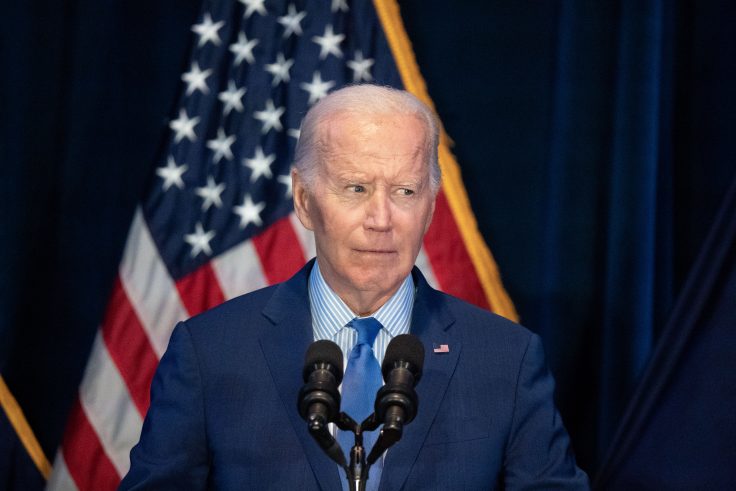The White House touted President Joe Biden’s "Investing In America Agenda" this week, as major companies warn that his administration’s strict environmental regulations are forcing them to reconsider investments in the U.S. that would otherwise help shore up domestic supply chains.
Biden’s Environmental Protection Agency said it will release "in the coming weeks" its final rule pertaining to a proposed ban on both commercial and industrial uses of methylene chloride, a chemical currently used by technology companies involved in the production of battery separators for electric vehicles.
The expected crackdown, which falls under the Toxic Substances Control Act, follows a November 2022 revised risk determination from the Biden administration’s Environmental Protection Agency concluding that methylene chloride presents an unreasonable risk of injury to health. In April 2023, the agency followed that determination with a proposed ban on all consumer and "most industrial" uses of methylene chloride, which several global companies involved in a critical part of the battery manufacturing supply chain are insisting will hamper their ability to enter the U.S. market. The companies say the regulation is overly burdensome and unattainable, forcing them to reconsider their American investments that they previously had planned.
"There's no software company in the world that can actually meet that regulation," Paul Chang, public relations director for Japan-based W-SCOPE, told the Washington Free Beacon. "We still need to analyze how the new regulation will impact our business in terms of long term strategy and how that's going to complicate our future investment in the U.S. But for now, we're looking at investment either in Canada or Mexico, because we need to be in North American operation 100% by 2029. And our only option at this point is those two countries."
This week the White House kicked off its "Investing in America tour," during which, for three weeks, Biden, Vice President Kamala Harris, their spouses, and senior White House personnel will travel to more than 20 states to promote what they say is the Biden administration’s commitment to domestic investments and boosting the American economy’s resilience. In a memo announcing the tour, the White House said President Biden’s economic policy has, among other things, "strengthened supply chains here at home."
However, several international companies involved in the production of battery separators for electric vehicles, a key component to the United States' domestic battery supply chain, sent letters to the EPA informing the agency that its planned regulation on methylene chloride is forcing them to reconsider their planned U.S. investments. SK IE Technology, a South Korea-based company with plans to enter the North American market within the next few years, indicated in a letter to the EPA that they view the proposed prohibition as "a gating issue which threatens to preclude US investment."
"The use of methylene chloride (MC) is essential to the process of producing separators necessary for the EV and clean energy agenda to succeed. Unless addressed, this Proposed Rule threatens that agenda and the ability to domestically produce key components like separators," the company said in its letter. The South Korean company also requested clarification on how the agency plans to categorize industrial versus commercial uses for methylene chloride, suggesting it adopt an alternative categorization method that would allow "safe, sustainable use of MC to produce high-quality EV battery separators in the United States."
Polypore International, another international battery separator manufacturer, similarly requested the EPA amend the parameters of its proposed final rule. "Without reliable access to lithium battery technology, the United States has no chance of meeting the Administration’s clean energy goals," a letter to the agency from Polypore stated. "With this in mind, we are asking the EPA to fully reconsider the proposed rule on methylene chloride and instead implement a solution that would allow existing mechanisms … to be properly modified based on appropriate and science-based exposure thresholds so that methylene chloride can continue to be used safely and responsibly in the United States of America."
The EPA insisted that it has worked closely with stakeholders throughout the rulemaking process. "EPA plans to finalize the risk management rule for methylene chloride in the coming weeks," the agency told the Free Beacon. "EPA cannot say exactly what the provisions of the final rule will be at this time, although public comments will inform any changes from the proposed rule."
Besides the proposed ban on methylene chloride, Cheng said the upcoming presidential election and loopholes being utilized by China, designated a foreign entity of concern by the U.S., are also factors that W-SCOPE is keeping an eye on to determine whether to follow through with their previously planned U.S. investments. "We need to see more clear guidelines on if the US regulators are willing to completely shut off their components, suppliers from China, and are they willing to close loopholes," Cheng told the Free Beacon. "That's our second biggest concern at this point."
